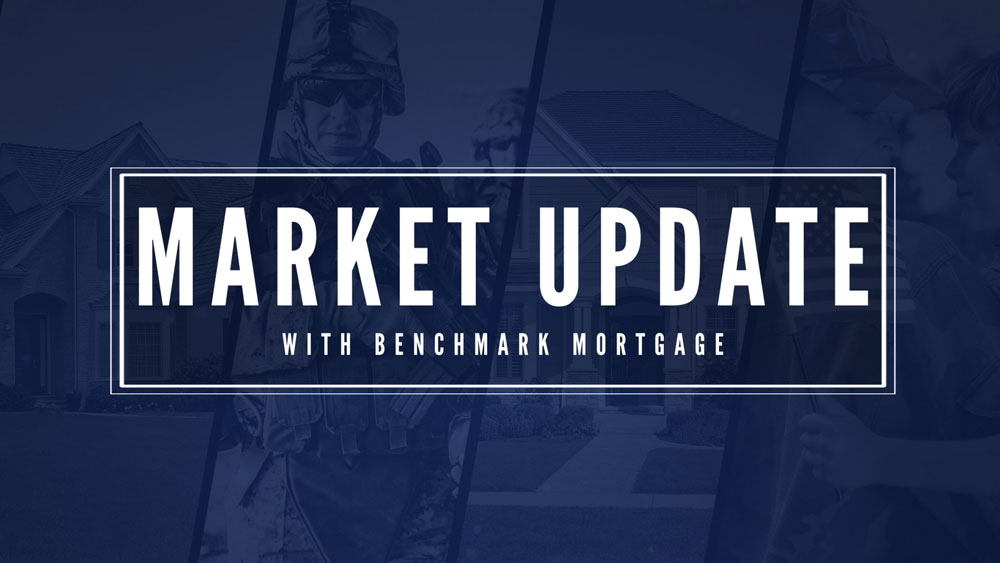Are rising mortgage interest rates enough to cool a heating market? Will housing inventory make a rebound? Your Spring 2021 update.


Are rising mortgage interest rates enough to cool a heating market? Will housing inventory make a rebound? Your Spring 2021 update.

COVID-19, the Federal Reserve cuts rates, and Rate locks now good for 60 days. A lot is going on in the housing market and the country as a whole. Let's dive in, and see how this could affect you and your mortgage.

Use the equity in your home to consolidate debt or pay for a repair or renovation with a Cash Out Refinance loan.

An IRRRL, or Interest Rate Reduction Refinancing Loan, is a quick VA refinance option with fewer qualifications and less paperwork than other refinance loan options. It’s meant to be a quick and non-complicated refinance option for qualified VA homeowners, and there is no appraisal requirement. Read more
In this video, Jim McMahan, President of Benchmark Mortgage, talks about the market, interest rates, and debt strategy to help you decide whether refinancing might be a good option for your financial goals.

Now, you could get a refinance loan for any term between 15 and 30 years! Get a better rate without "starting over". Benchmark presents: Odd Term Mortgages.


If you are thinking about refinancing, you probably have a good reason. Maybe you are curious if you could save money by locking in a lower interest rate. Maybe you wonder if you could use some of the equity you have established in your home. Whatever your reason, here are 5 things to know before deciding if refinancing makes sense for you.
Not sure if Refinancing is a good idea? While refinancing may not be the best choice for everyone, there are a few good reasons to refinance.
Maybe you are motivated to pay off your home sooner. If so, by refinancing to a shorter term mortgage (for example, a 15 year mortgage from a 30 year mortgage), you could set yourself up to be paid off in nearly half the time, depending on the maturity date of your existing mortgage.
Shorter term mortgages often come with smaller interest rates than their longer term counterparts. This can make the increased mortgage payment easily justifiable with the potential decrease of interest payments overall.
Maybe you bought when interest rates were higher. While timing the market is a risky practice, at best, if the current average interest rates are significantly lower than the rate on your current mortgage, refinancing may look like an attractive option.
If your current mortgage is a few years old, refinancing into a new mortgage with the same term could reduce your monthly payment obligation. While this will likely increase the total interest you will have paid over time, the lower payment could free up cash for other expenses or goals.
If you opted for an adjustable rate mortgage due to a lower starting interest rate, you have likely noticed the periodic shifts, up or down, that your interest rate may have taken since originating your mortgage. If you are seeking a little more financial consistency, refinancing with a new fixed rate mortgage may be an appealing option.
Has your home increased in market value since you bought it? Do you think your equity could be used better than being tied up in your home? A Cash Out Refinance may be for you. Mind the risk!
Do you have other debt with higher interest rates? Do you think it would be a good idea to roll that debt into your mortgage instead? A Cash Out Refinance may be an appropriate option for you. Just like above, we strongly recommend that you mind the risk!
Low down payment mortgages are a great way to take advantage of the right opportunity, but it comes with Private Mortgage Insurance. In order to get a new loan without PMI, you will have to have at least 20% equity in your home. If you have that, dropping the added monthly expense for the PMI could help pay your home off sooner (with a shorter term mortgage), or result in more available cashflow on a monthly basis.
The Amortization date (or the time until the death of the loan) is an important aspect to consider if you think you may want to refinance your home. A longer term (like the common 30 year mortgage) will have lower monthly payments, but means you will be paying more interest overall, and paying for more years. A shorter term, like a 15 year mortgage, benefits from less overall interest cost due to fewer interest payments. Shorter terms also often come with lower interest rates than their 30 year counterparts, helping you save even more over the long run. However, a shorter term also means higher monthly payments, as the principle is spread over a shorter period of time.
Deciding which term is right for you will depend on your monthly cash flow, and your personal goals. Your loan officer can help you to determine the right loan for you.
The costs associated with Refinancing can be complicated, when all is taken into consideration. If your goal is simply to save money, it may or may not make financial sense to refinance. Your loan officer can help you consider all facets that may effect the overall cost or benefit of a refinance.
If you are refinancing for a different reason, do the math to be clear on where you stand. A mortgage is a big commitment, and it’s a good idea to thoroughly understand the new agreement before jumping in.
Total Closing Costs / Monthly Savings = Break-Even Point
The “Break-Even Point” is calculated by a simple formula, dividing the total closing costs by the monthly savings. The calculator linked below can help give you an idea about what your break-even point might be. This is the point in the life of the new loan where the new mortgage effectively pays for its own closing costs.
Why is this useful? If your goal is to save money, you may want to stay in your current mortgage if you plan to sell your home before the break-even point. Selling before you’ve reached the break-even point will end up costing you more overall.
As mentioned earlier, a mortgage is a big commitment. There is always risk present when taking out a loan, especially when defaulting means losing your home. This is especially important to consider before taking a Cash Out Refinance to consolidate debt, especially debt that is not secured.
If you miss payments on a credit card, or student loan, you will have collectors giving you a hard time. If you the same debt is rolled into a mortgage, it becomes guaranteed by your home. Defaulting on a mortgage could result in losing your home. While consolidating high-interest debt into a low-interest mortgage can be a good long-term strategy, it may not be for everyone.
At Benchmark, we do more than sell a low interest rate. We look closely to help you determine the right loan for you. Even if you don’t feel ready, talking to us now can help you set a course for success.
Find your Benchmark branch, and contact them today for more information.Give us a call or contact us today. At Benchmark, we’ve got your back.Give me a call, send me an email, or request a call today. Along with my Benchmark community of mortgage pro’s, I’ve got your back.

The Mortgage Bankers Association reported a 4.1% increase in mortgage applications from the prior week.
Steve Remington, Benchmark’s Chief Operations Officer, noted that the increase in applications could be a consumer response to the recent trend in the market, indicating a shift from the prolonged period of low interest rates.
“Mortgage Bankers Association Data indicates a slight uptick in refinances for people who might be trying to take advantage of these lower interest rates. We don’t foresee doom and gloom with rates skyrocketing, but we do see an upward pressure of interest rates in the short term,” says Mr. Remington.
He also suggests that people in the process of building a home, or looking to build a home, may wish to consider looking at options to lock in their interest rates early. “If you are building a house and it takes 6-12 months to build, you might consider seeking a long-term lock option that Benchmark may be able to offer.”
You can read the full report from the Mortgage Bankers Association here.

The HomeStyle Renovation Program is available to borrowers who are looking to make Renovations, Repairs, or Improvements to a home with a single loan, rather than with a second mortgage, or home equity line of credit.

At Benchmark, we know how important it is to make a house your own. Your Benchmark loan originator can walk you through the steps of making your homeownership dreams a reality. To find a Benchmark location near you, click here.
At Benchmark, we know how important it is to make your house your own. I am happy to walk you through the steps of making your homeownership dreams a reality. To get started, give me a call, send me a message, or apply now.
At Benchmark, we know how important it is to make a house your own. As your local Benchmark branch, we stand ready answer your questions and walk you through the steps of making your homeownership dreams a reality. To get started, send us a message or apply now.

“The sudden stop in employment growth rules out any chance of a rate hike from the Fed at next week’s FOMC meeting, particularly now that the UK vote on whether to leave the European Union appears to be going down to the wire,” said Capital Economics Chief Economist Paul Ashworth. (source: Housingwire.com)
Britain’s exit from the EU increases the value of the dollar, which will push U.S. mortgage rates still lower. “This would create another mini refinance mortgage boom at financial institutions as homeowners rush to lock in near-historic low interest rates,” says Steve Rick, chief economist for CUNA Mutual Group. (source: Bankrate.com)
As Paul Ashworth indicated in his quote in HousingWire, The Federal Open Market Committee (who determines monetary policy of the Federal Reserve) is not likely to raise interest rates in their next meeting in July.
Futures dropped in the wake of the UK’s vote to leave the EU today, June 24th. This lack of confidence puts more pressure on the FOMC to, once again, postpone a rate hike.
The pound fell to near 1985 levels, making it the lowest value in three decades. According to the Federal Reserve of St. Louis, 1GBP is now down to 1.37USD. (source: WashingtonPost)
When our currency is worth more, it has more purchasing power, which is cause for suspecting that this could make the cost of housing cheaper still.
Is a refinance boom coming? That remains to be seen, but with the relatively high supply in the housing market coupled with a stronger dollar, we may begin to see the supply begin to normalize as homeowners cash out on their accumulated equity.
No matter your opinion of the EU Referendum result, mortgages are still, historically speaking, ridiculously cheap.
Mortgage prices tend to follow Treasury yields, which have been trending down all year, too. Last week, the interest on 10-year Treasuries dropped to its lowest in four years on worries that Britain would vote to leave the European Union. When the political and economic outlook is uncertain, the world’s money tends to flow into safe investments like U.S. bonds, including mortgages. – Loraine Woellert, Senior managing editor for Redfin research (source: Forbes.com)
Notes: